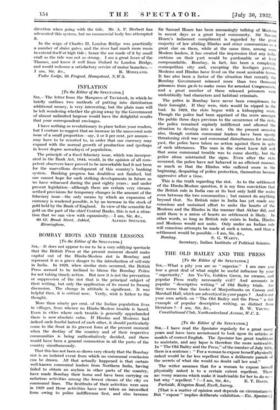BOMBAY RIOTS AND THEIR LESSONS [To the Editor of the
SPECTATOR.] SIR,—It does not appear to me to be a very edifying spectacle that the British Press at the present moment should make capital out of the Hindu-Moslem riot in Bombay and represent it as a grave danger to the introduction of self-rule in India. In 1929, when similar riots occurred, the British' Press seemed to be inclined to blame the Bombay Police for not taking timely action. But now it is not the prevention or suppression of the riot that is the principal subject of their writing, but only the application of its moral to Swaraj discussion. The change in attitude is significant. It was helpful then, it is critical now. Verily, wish is father to the thought.
More than ninety per cent. of the Indian population lives in villages, from whence no Hindu-Moslem trouble is heard. Even in cities where such trouble is generally apprehended there is now absolute calm. If Hindus and Moslems had indeed such fearful hatred of each other, it should particularly come to the front in its gravest form at the present moment when the destiny of the country and of their respective communities is being authoritatiVely decided, and there would have been a general commotion in all the parts of the country simultaneously.
That this has not been so shows very clearly tali& the Bombay riot is an isolated event from which no communal conclusion can be drawn. All that actually happened is that certain well-known communal leaders from Northern India, having failed to obtain an asylum in other parts of the country, have made Bombay their home and have been carrying on nefarious activities among the lowest classes of the city on communal lines. The firstfruits of their activities were seen in 1929 and these activities have now taken an intensified form owing to police indifference first, and also because
Sir Samuel Hoare has been unceasingly talking of Moslems in recent days as a great loyal community. Sir Samuel -Hoare's' indiscreet compliment is regarded by the great majority of law abiding Hindus and other communities as a great slur on them, while at the same time, among some Moslem leaders, it has created the impression that any indis- cretions on their Fart would be pardonable or at least compoundable. Bombay, in fact, has been a completely cosmopolitan city and, excepting the hooligan portion, Moslems and Hindus have lived on the most amicable terms. It has also been a factor of the situation that recently the Bombay Government released more than two thousand prisoners from gaols to make room for arrested Congressmen, and a great number of these released prisoners were undoubtedly bad characters and habitual criminals.
The police in Bombay have never been conspicuous for their foresight. If they were, riots would be nipped in the bud. In 1929, the riots began with a kidnapping scare. Though the police had been apprised of the scare amongst the public three days previous to the occurrence of the riots, the police remained supinely indifferent and allowed the situation to develop into a riot. On the present occasion also, though certain communal leaders have been openly threatening civil war and communal disturbances for months past, the police have taken no action against them in spite of such utterances. The man in the street knew full well that some communal trouble was to come shortly, but the police alone mistrusted the signs. Even after the riots occurred, the police have not behaved in an efficient manner, so much so that the Hindus who suffered more in the beginning, despairing of police protection, themselves became aggressive after a time.
This is the truth regarding the riot. As to the settlement of the Hindu-Moslem question, it is my firm conviction that the British rule in India can at its best only hold the scales even between the two communities ; but cannot do anything beyond that. No British ruler in India has yet made any conscious and sustained effort to unite the hearts of the Moslems and the Hindus in the manner that Akbar did, and until there is a union of hearts no settlement is likely. In other words, so long as British rule exists in India, Hindus and Moslems would not unite. Only under an Indian rule will conscious attempts be made at such a union, and then a settlement would be possible.—I am, Sir, &c., Secretary, Indian Institute of Political Science.






























 Previous page
Previous page